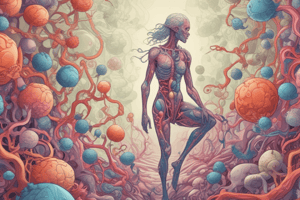Podcast
Questions and Answers
What is the correct sequence of organization in a living organism?
What is the correct sequence of organization in a living organism?
- Cells → Tissues → Organs → Systems → Organism (correct)
- Cells → Organs → Systems → Organism
- Organs → Tissues → Cells → System → Organism
- Tissues → Cells → Systems → Organism
Which statement accurately defines tissues?
Which statement accurately defines tissues?
- Tissues are made up of different types of organs.
- Tissues are individual cells that work independently.
- Tissues cannot be organized into larger structures.
- Tissues are groups of similar cells that perform a specific function. (correct)
Which of the following is an example of an organ?
Which of the following is an example of an organ?
- Blood
- Cell
- Tissue
- Heart (correct)
What role do systems play in the organization of an organism?
What role do systems play in the organization of an organism?
How does an organism relate to the different levels of biological organization?
How does an organism relate to the different levels of biological organization?
What is the primary function of epithelial tissues?
What is the primary function of epithelial tissues?
Which type of muscle tissue is classified as involuntary?
Which type of muscle tissue is classified as involuntary?
What type of muscle is found in the heart?
What type of muscle is found in the heart?
Nerve tissue serves to:
Nerve tissue serves to:
Which type of muscle tissue can be voluntarily controlled?
Which type of muscle tissue can be voluntarily controlled?
How many main types of tissues are identified in the content?
How many main types of tissues are identified in the content?
Which of the following statements about muscle tissue is correct?
Which of the following statements about muscle tissue is correct?
What distinguishes voluntary muscles from involuntary muscles?
What distinguishes voluntary muscles from involuntary muscles?
What function does connective tissue primarily serve in the body?
What function does connective tissue primarily serve in the body?
Which type of connective tissue forms a thick layer under the skin?
Which type of connective tissue forms a thick layer under the skin?
What is the primary function of cartilage?
What is the primary function of cartilage?
What unique characteristic does bone tissue possess?
What unique characteristic does bone tissue possess?
How do tissues contribute to organ formation?
How do tissues contribute to organ formation?
Which sequence correctly represents the organization of biological structures in the human body?
Which sequence correctly represents the organization of biological structures in the human body?
Which part of the body is not included in the digestive system?
Which part of the body is not included in the digestive system?
Which connective tissue type is primarily responsible for connecting muscles to bones?
Which connective tissue type is primarily responsible for connecting muscles to bones?
Flashcards are hidden until you start studying
Study Notes
Human Body: Types of Tissues, Organs, and Body Systems
- Tissues are groups of similar cells that perform specific functions in the body.
- There are four main types of tissues:
- Epithelial Tissue: Covers external and internal surfaces; involved in protection and hormone production.
- Muscle Tissue: Specializes in movement; includes voluntary muscles (controlled movements), involuntary muscles (uncontrolled movements), and cardiac muscle (found in the heart).
- Nerve Tissue: Coordinates bodily functions and responds to the external environment.
- Connective Tissue: Connects and supports body organs; includes fatty tissue, cartilage, fibrous tissue, bone, and blood.
Specialized Connective Tissues
- Bone Tissue: Strong, mineralized matrix composed of calcium phosphate; provides support and protection for the body.
- Blood: A fluid connective tissue that transports gases, nutrients, and waste throughout the body.
Hierarchical Organization of the Human Body
- Cells form tissues; tissues form organs, and organs form body systems.
- Each organ is a collection of tissues working together for a specific function, such as the digestive system.
- A body system is a group of different organs working collaboratively, e.g., the digestive system includes the mouth, esophagus, stomach, and intestines.
Organism Structure
- The organization progresses as follows: Cells → Tissues → Organs → Systems → Organism.
- The arrangement and function illustrate the complexity and efficiency of biological systems.
Noteworthy Fact
- Joseph Murray performed the first successful kidney transplant in 1954 using the recipient's identical twin as a donor; kidney transplants have since become routine and impactful in medicine.
Studying That Suits You
Use AI to generate personalized quizzes and flashcards to suit your learning preferences.




